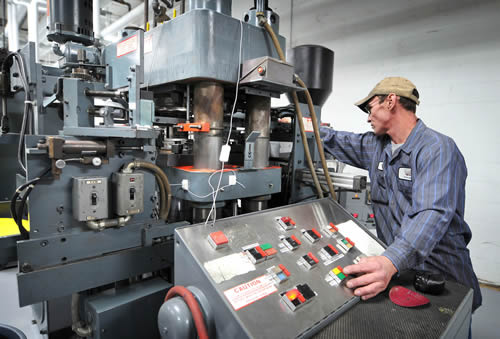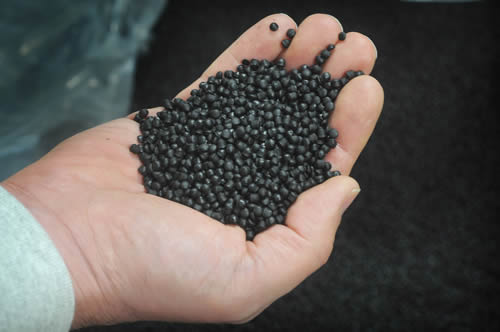By DAVID CLOUSTON
Salina Journal
Two things become clear in the first few minutes while Chad Kassem gives visitors a tour of the latest addition to his expanding business empire.
One is that the worn and greasy unrestored record presses resting in pieces in a dark warehouse corner show how much work it will take to bring them back to life.
The second thing is that those unused presses are ample proof Kassem's business isn't through growing.

Six restored presses resting under bright fluorescent bulbs atop a freshly painted floor in a room nearby appear as shiny as the day they left the factory. They're all 30 years old or older and have been tricked out with the latest electronic monitoring devices.
"Paint 'em now, clean them up. Do everything you can think of. Now is the time," was Kassem's charge to the technicians he's hired to make his latest vision for his company a reality.
Salina for years has been known for the products made here and shipped nationwide -- automotive batteries, frozen pizzas, fluorescent lamps, farm tillage implements, firefighting equipment and airport shuttle buses, to name a few. Now, thanks to Kassem, high-quality vinyl records can be added to the list.
That's right -- vinyl LPs. Turns out the medium wasn't dead, it was merely resting. Driving the market is an increasing demand for the superior quality of music that vinyl LPs provide over the more popular CDs.
Kassem has lately invested heavily in north Salina for his new business, Quality Record Pressings. The idea is to enhance the market for collectors of re-issued classic recordings as well as original recordings released by APO Records, his company's record label.
Today, his businesses employ 35 workers, and he's hired five, so far, for the pressing plant.
Kicked to the side
In 1986, at the age of 24, Kassem started buying and selling used audiophile LPs and CDs from his apartment. The enterprise became a business, Acoustic Sounds, which today has expanded to include a sister business, Analogue Productions. Analogue reissues choice jazz, blues, classical and folk recordings. In 1993, Kassem began augmenting his reissues with original recordings focused on the blues, his favorite genre, on APO (Analogue Productions Originals) Records.
"Once vinyl started really taking off, we were a very good customer at (another) pressing plant," Kassem, 49, explained. "But when the big major (record labels) came knocking, all of a sudden we weren't so big anymore. We weren't so important anymore. So we kind of got kicked to the side."
About four years passed before Kassem decided to do something about the increasing delays in getting his records pressed. In late December 2010, he tripled the size of his core business, buying three empty buildings in the neighborhood of North and Ninth streets, altogether totaling about 70,000 square feet.
One, an enormous warehouse, now houses the majority of the record album inventory, as well as the shipping department. Another is a nearby office building that houses the administrative staff, customer call center, graphic designers and more storage for preowned LPs.

Lastly, Kassem bought a former refrigerated warehouse and is turning it into the home of his newest venture, Quality Record Pressings.
Better than orignals
These days some rare vinyl LP collectors say fine reissues of classic jazz and classical recordings are better than the originals in many cases, for four main reasons. First, they feature super fidelity reproduction at 45 revolutions a minute instead of 33Ôªø1âÑ3 rpm. Second, they're made with higher-quality, thicker vinyl at 180 grams or better. Third, they're produced with meticulous remastering, using the original source analog tape recordings used to produce the original record. And lastly, they're made with pristine vinyl with no wear.
The New York Times, in an August 2010 article profiling Analogue Productions and other companies involved in reissuing jazz recordings, called the 45 rpm a fringe phenomenon but one that's "the fine-laced fringe of a market that's in revival."
The Times reported that in 2009, 2.5 million LPs were sold nationwide, up from 1.9 million in 2008 and 990,000 in 2007. The numbers amount to less than 2 percent of the music market, but they're at their highest level in two decades.
Prices for top-quality reissued LPs can run $50 or more. That may seem outlandish, but not so much to audiophiles whose turntables cost a few thousand dollars and their stereo systems much more.
"We looked like idiots for a long time. We were the only ones going against the grain (by sticking by vinyl LPs)," said Kassem, who reissued his first record title in 1992, Virgil Thomson's "The Plow That Broke The Plains," originally issued on Vanguard records. Now, with vinyl sales picking up, "We're looking like geniuses."
A dedicated following
Even as CDs became lauded in the 1980s as the nail that would hammer shut vinyl's coffin, some critics of the format thought writing off vinyl was premature.
"There was always a dedicated following. It's as absurd as saying books were going away when the Kindle was invented," said Michael Fremer, referring to Amazon.com's electronic book reader. Fremer is a senior contributing editor for Stereophile magazine and editor of the audiophile website musicangle.com.
Fremer describes music on CDs as the "sex equivalent of sandpaper condoms," and he's watched and written about Kassem's record-pressing adventure with growing interest.
"What he's done is unbelievable. It's already a world-class processing plant. But it has the potential of being the best," Fremer said.
You get 2 vinyl discs
The grooves on an LP are the music's actual acoustic waves, etched by a cutting head into the soft lacquer of a master disc. The grooves on a 45 rpm LP are spread out more widely, so a turntable's cartridge ferrets out very quiet sounds and fine details, such as the full shimmer of a cymbal or the vibrating wood of a bass.
Since 45 rpm is about one-third faster than the 331âÑ3 rpm of standard LPs, each disc holds a third less music, meaning the tracks on a single album have to be spread out over two vinyl discs instead of a two-sided single disc.
Kassem, working with other record plants, has released in the neighborhood of 300 titles in LP and super audio CD formats.
Those discs have included work from the catalogs of such legendary record labels as Blue Note, with leading artists Art Blakey (drummer and bandleader) and Lou Donaldson (saxophonist), and Impulse!, with saxophonist John Coltrane.
"We're going to be as busy as we want to be. We really don't want any more business than we already have. If all I do is press my own records, I'll be all right," Kassem said.
"And if it's just my own records, and people go, 'I like his label because his label has the best vinyl,' how bad can I go wrong there?" he asked.
Other businesses doing well
Kassem also is enjoying success in his other ongoing ventures. About a quarter of Acoustic Sounds' business is overseas, mainly in Germany, Japan and Hong Kong. The company also has strong customer bases in New York, Chicago and Los Angeles. The warehouse ships 250 to 300 orders a day consistently.
Kassem also owns Blue Heaven Studios, a converted church on South Eighth Street, where each October he hosts a two-day blues festival that draws music fans from across the country and even other nations.
Kassem chose to stay in Salina when he decided to move the company from its 18,000-square-foot former home at 1500 S. Ninth. He gave some thought to relocating closer to his hometown of Lafayette, La., but decided against it.
"This was a lot of work to move across town. It probably would have been a million dollars to move (the business) to Louisiana," he said. "My family's here, we have a little girl. There are a lot of good things here. I like Salina. And the things it lacks, we try to bring -- like music and food. We try to bring the party here."
 In-Stock Music Orders Over $99 SHIP FREE Within The Continental U.S.
In-Stock Music Orders Over $99 SHIP FREE Within The Continental U.S.







 Login
Login
 My Account
My Account
 Cart
Cart Wishlist
Wishlist
 Contact
Contact




